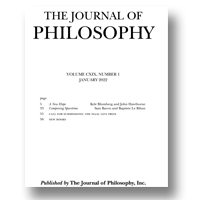|
1.
|
The Journal of Philosophy:
Volume >
120 >
Issue: 2
Kyle Blumberg
Wishing, Decision Theory, and Two-Dimensional Content
abstract |
view |
rights & permissions
| cited by
This paper is about two requirements on wish reports whose interaction motivates a novel semantics for these ascriptions. The first requirement concerns the ambiguities that arise when determiner phrases, such as definite descriptions, interact with ‘wish’. More specifically, several theorists have recently argued that attitude ascriptions featuring counterfactual attitude verbs license interpretations on which the determiner phrase is interpreted relative to the subject’s beliefs. The second requirement involves the fact that desire reports in general require decision-theoretic notions for their analysis. The current study is motivated by the fact that no existing account captures both of these aspects of wishing. I develop a semantics for wish reports that makes available belief-relative readings but also allows decision-theoretic notions to play a role in shaping the truth conditions of these ascriptions. The general idea is that we can analyze wishing in terms of a two-dimensional notion of expected utility.
|
|
|
2.
|
The Journal of Philosophy:
Volume >
120 >
Issue: 2
Owen Griffiths, A. C. Paseau
Ways of Being and Logicality
abstract |
view |
rights & permissions
| cited by
Ontological monists hold that there is only one way of being, while ontological pluralists hold that there are many; for example, concrete objects like tables and chairs exist in a different way from abstract objects like numbers and sets. Correspondingly, the monist will want the familiar existential quantifier as a primitive logical constant, whereas the pluralist will want distinct ones, such as for abstract and concrete existence. In this paper, we consider how the debate between the monist and pluralist relates to the standard test for logicality. We deploy this test and show that it favors the monist.
|
|





